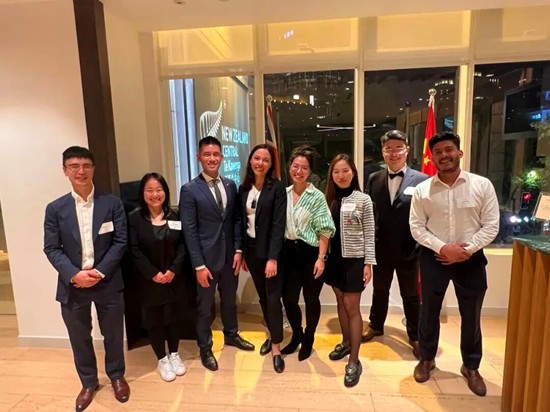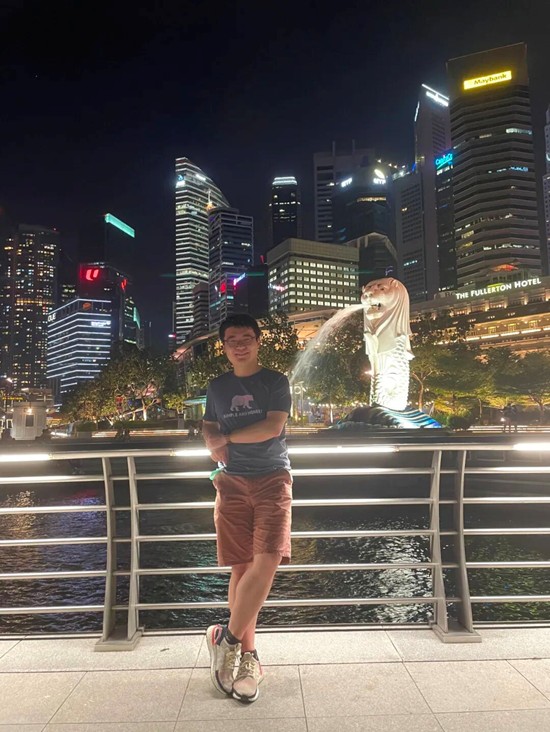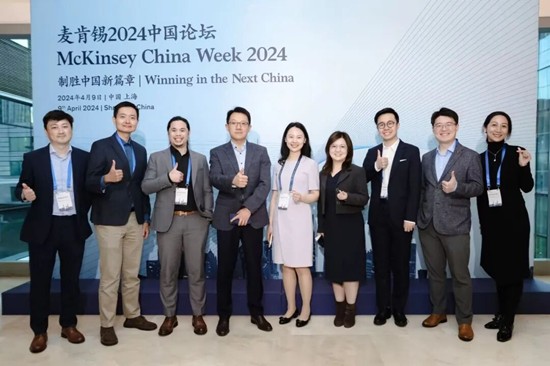Breaking Career Barriers: Choosing the Road Less Travelled

Today, while researching the prospects of the global energy transition at McKinsey’s Houston office, CEIBS MBA 2021 alum Tony Li sometimes recalls the autumn of 2019, when he had just returned to Shanghai from New Zealand. Back then, he was standing at the crossroads of transitioning from a consultant in the forestry industry into a business decision maker. The CEIBS MBA was the lighthouse that helped him find his way forward.
Today, after building a career that spans China, New Zealand and the United States, Tony has become a seasoned expert in the energy transition sector at McKinsey. His journey is not one of sudden leaps, but rather about cognitive upgrades and precise focus.
As Tony reflects:
“Since 2010, my way of thinking and understanding the business world and life has been deeply shaped by a podcast hosted by CEIBS EMBA alumnus Mr. Liang Dong. His podcast taught me that ‘professionalism’ and ‘being a friend of time’ should be the core principles guiding my life. From then on, it was all about rolling this small snowball along the long hill of life. Every career transition I’ve made was about slipping through the door that fate opened when my cognition and capabilities were finally sufficient.”
His story may just offer a blueprint for anyone seeking their next career breakthrough. Read on to learn more.

From “Getting Things Done” to “Making Things Happen” - The Awakening of a Technical Expert
Before embarking on his MBA journey at CEIBS, Tony had already spent four years immersed in the consulting sector of New Zealand’s forestry and natural resources industry. By then, he had mastered the nuances of forest management and investment and witnessed the final investment decisions made by forestry sector investors across Asia, Africa, and Latin America, and was capable of delivering best practice in his field. Yet, one question continued to linger in his mind:
“I can deliver excellent work, but I don’t know how to leverage my niche know-how to make a bigger impact on the global level, get my hands dirty in the real business building process, and use my capabilities in influencing impactful business decisions. Am I really going to stay in this comfort zone forever?”
This kind of bottleneck is a common predicament for many professionals with a technical background. Once you hit the ceiling of technical expertise and aspire to pivot towards the business front, what’s often missing is a broader industry perspective, the ability to connect resources, and the mindset shift from executor to decision-maker.
As Tony puts it:
“I realised back then that relying solely on technical expertise would keep me confined to a small professional circle. The real power to shape business decision-making lies with those who can recognise — or even create — the right timing, location and team.”

In 2017–2018, as China continued to develop at a remarkable pace, Tony developed the idea of returning home to explore new opportunities. He applied to HKUST, Peking University’s National School of Development, and CEIBS. He received scholarships from the first two, but his ultimate decision to choose CEIBS was both pragmatic and forward-looking:
“Mr. Liang’s podcast, ‘Dong & Wu Talk Show’ (《冬吴相对论》), laid a crucial foundation for how I think about professional and personal life. During my first four years of career life in New Zealand, I had already familiarised myself with a wealth of CEIBS business cases. Meanwhile, the influence of CEIBS’ alumni network in China’s business world is both profound and far-reaching. When my Chinese clients and business partners learned that I was applying to a business school, they all unanimously urged me to choose CEIBS. In addition, I’d observed through my interactions with peers in China’s forestry industry that in Chinese business, what truly matters is never what is put on paper — but traveling alongside a trustworthy business community.”
It turned out that this one choice planted the seeds for Tony’s future transformation.
“On my very first day at CEIBS,” Tony recalls, “I was amazed by the vitality in both the classroom and the alumni community. The international business cases I already knew well were indeed discussed in class, and our professors also brought in the freshest Chinese business cases, even inviting alumni from the case companies to share their actual experience along their journey and openly answer the challenging questions we raised. Experiencing the delicate contrast between ‘the confusion of being behind the wheel' and ‘the clarity of looking in the rear-view mirror’ left a deep impression on me.”
Finding the niche path through clarifying and enhancing his value proposition
Tony often sums up his CEIBS MBA journey as a process of “Diverging first, then converging” — a typical McKinsey problem-solving approach that became the cornerstone of his career breakthrough and the starting point of his “narrow gate” strategy.
Instead of blindly following the crowd, he chose to broaden his horizons: self-reflecting and learning the business world; exploring as many internship opportunities as possible to understand how the job is done, and learning from classmates and alumni pursuing different career paths. Then, through reflection and deliberate choice, he identified his one “narrow gate” — a calling that inspired his passion and curiosity.

Start with Addition - Expanding the boundaries of insights and connections
When Tony first joined CEIBS, he was exposed to a great deal of new non-technical knowledge.
1. Expanding his cognitive horizons
In the classroom, Tony learnt diversified business building and decision-making process from business cases about companies like Costco and Amazon. Courses like Corporate Finance and Operations Management equipped him with a solid knowledge framework about business operation and planning.
Tony recalls, “I even summarised the insights of several CEIBS China cases for colleagues in other McKinsey offices to help them better understand the unique dynamics of China’s business landscape.”
2. Expanding his habits
CEIBS professors constantly emphasised the importance of understanding how macro policies shape industries, which inspired Tony to develop the habit of reading professional economic media like the Financial Times and Caixin. From China’s dual carbon goals to the US Inflation Reduction Act and the EU Net-Zero Industry Act, Tony could always quickly spot critical policy signals in the energy transition sector.
He shares, “These habits have helped me handle challenging questions from client CEOs and company partners with ease countless times.”
3. Expanding his network
The CEIBS alumni community opened doors for Tony to connect with top talent across industries — from classmates and EMBA mentors who advised him to “think twice before jumping into finance sector”, to younger peers sharing the B2C sector's pain points, and even fellow members of the CEIBS Cycling Club with whom he still keeps in touch today. These real-life experiences offered him real-world insights that no market report could reveal.
Unexpectedly, even after relocating to Houston in the US, CEIBS continued to be his anchor. “Ten alumni from different industries got together to celebrate Chinese New Year on my first week of arrival, chatting about local business culture,” Tony recalls. “It helped me quickly build a clear mental map of the city’s communities and industry landscape.”

Do Less, Achieve More - From “trying everything” to “focusing on what I do best”
While “diverging” broadened Tony’s horizons, it was “converging’ that truly guided him in determining his direction. By learning from classmates and alumni, he quickly ruled out paths that didn’t fit him.
1. Focus on B2C
“I appreciate the long-term mindset of B2B sectors better; the fast pace and marketing and sales driven business culture of the B2C sector just doesn’t fit my skill set.”
2. Stay away from areas in which you don’t excel
“I knew that the financial service sector wasn’t for me long before the downturn — neither my interests nor my strengths aligned with it. One of my mentors also kindly reminded me that my personality simply doesn’t fit the industry.”
This “converging mindset” lies at the heart of Tony’s “narrow gate” strategy. In this era of overwhelming access to information and “opportunities”, knowing what not to do may matter just as much as knowing what to pursue.
In the end, he set his sights on the energy transition and industry research, realising that his natural strengths — a sharp eye for detail and the patience to connect dots among complex facts — were exactly what this field demands.
“Career development isn’t about choosing what you like, but about choosing what you’re good at — and then amplifying those strengths in the areas that need them most.”

This principle, often emphasised in CEIBS case studies cited in The Dong & Wu Talk Show and repeatedly reinforced by multiple professors in class, was key to Tony’s smooth transition from forestry consultant to McKinsey energy transition expert in the oil and gas sector. While other colleagues were still unfamiliar with cutting-edge topics like sustainable fuels, BECCS, and the carbon border adjustment mechanism, Tony had already leveraged his long-cultivated industry knowledge to become the team’s "go-to" person.
From CEIBS to McKinsey: Upholding the responsibility of a leader in the face of uncertainty
At McKinsey today, Tony still senses a similar spirit to CEIBS — both are “lifelong learning organisations.” More importantly, as thought leaders in their respective fields, they bear the responsibility of guiding their industries. Tony reflects: “Being number one in an organisation means you must take on the responsibility of leadership. Both at CEIBS and McKinsey, the constant question is: how can we make our organisation, our industry, and even our society better?”
This sense of leadership manifests in how both respond to uncertainty: as Asia’s top MBA programme, CEIBS equips candidates with Chinese business insights from the world’s largest China-focused case library, helping them navigate a changing global business environment; as a leading global consultancy, McKinsey embraces technological innovation and explores new service models to meet evolving strategic advisory demands. In both cases, there are no ready-made answers that can simply be copied. Every individual must seek growth for the organisation and, in doing so, drive their industry forward even amid uncertainty.

Tony’s growth is a testament to his ability to navigate uncertainty: at CEIBS, despite the unexpected disruption of the pandemic, he persisted in building his insights about policy and industry dynamics; at McKinsey, in the emerging field of energy transition, he continuously updated the organisation’s knowledge framework through ongoing communication with global internal and external experts and clients, providing critical support to project teams worldwide.
“What both CEIBS and McKinsey taught me,” Tony reflects, “is exactly the famous quote from Steve Jobs ‘Stay Hungry, Stay Foolish’ — no matter how the environment changes, you can always get the most of it.”
This trait of “continuous learning and proactive contribution” has long become part of his work routine: at CEIBS, he shared industry news with classmates; at McKinsey, he contributes over 90% of posts for the Greater China Energy Transition interest group and compiles project insights into knowledge documents for the entire firm — because he knows that a leader’s position is not earned through past achievements, but by continuously contributing to the organisation’s capability building.
Three Career Tips for Future CEIBS Applicants
Looking back on his own career transformation, Tony shares three practical tips for prospective CEIBS MBA candidates:
- From technical to business — don’t rely on hard skills alone: Your technical background is an advantage, but to become a true business leader, you need to build soft skills too — industry insight, networking, and business acumen. An MBA is the perfect platform to develop these capabilities.
- “Choose the narrow path” isn’t being conservative, it’s being precise: Don’t blindly chase trendy industries. First, identify your unique value proposition — for example, if you excel at data analysis, focus on a niche where this skill is crucial, rather than following the crowd. Understand yourself, have an open mindset, and you’ll find your own “narrow path” through clarity and deep focus.
- Leverage the alumni network — it’s your low-cost trial-and-error lab: CEIBS alumni come from all industries, and their insights can help you quickly rule out unsuitable directions and save years of detours. Remember, the most valuable information is always hidden in conversations built on trust.
From Rotorua to Shanghai to Houston, from a forestry consultant to a McKinsey expert, Tony’s journey wasn’t about miracles — it was all about clear decisions and continuous accumulation. As he puts it: “Career transformation isn’t a leap of faith; it’s about taking steady steps once you’ve clarified the direction.”









